Southwell MinsterChurchyard
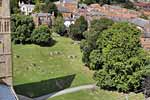 The north-west section The north-west section
of the churchyard |
The churchyard surrounds the Minster completely and is bounded on the west side by Westgate, to the north by Church Street, to the south by the Archbishop of York’s Palace and to the east by Vicars’ Court. It occupies an area of 1.7 ha.
The Minster is located in the south-eastern corner and is surrounded by burials on all sides.
Gateways
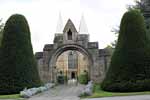 Gate A Gate A |
 Gate B Gate B |
There are three stone gateways, understood to have been built in the mid-fourteenth century.
 GATE A (to the west, fronting onto Westgate, with a semicircular entrance layout) is a listed structure, described thus in the listing document: GATE A (to the west, fronting onto Westgate, with a semicircular entrance layout) is a listed structure, described thus in the listing document:
Gateway and flanking walls are mid 14th century, restored in the 19th and the 20th centuries. Ashlar. Gabled stone coping. Stepped gabled gateway with pyramid-roofed finial. East and west sides of the finial have a cusped niche with ogee hood mould. Double chamfered round arch with chamfered imposts and early 19th century pendant lamp. On either side, curved flanking walls with square piers with pyramidical caps. Beyond, on each side, straight sections of boundary wall, each approximately 15 metres long
GATE B (in the north-east corner of the churchyard, near to Vicars’ Court) and GATE C (to the north fronting onto Church Street opposite the north Transept of the Minster) are listed as a separate entity by English Heritage:
Two gateways and churchyard wall. 14th century, restored in the 19th century. Dressed stone and ashlar. Wall, approximately 120 metres long, with gabled coping. Each gateway has a stepped flat-topped gable and a plain round headed opening. The left gateway is larger and has a pair of wrought iron carriage gates. The smaller gateway has a gate for walkers.
Footpaths
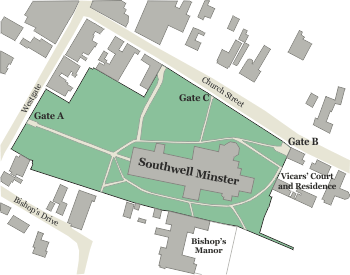 There are several important footpaths through the churchyard, which represent urban thoroughfares as well as providing access for worshippers and visitors. The main paths are: There are several important footpaths through the churchyard, which represent urban thoroughfares as well as providing access for worshippers and visitors. The main paths are:
- From GATE A to the west door of the church
- From Bishop’s Drive and the Trebeck Memorial Hall, crossing the front of the west door and leading to Church Street via the Refectory/Cathedral Shop
- From outside the west door, clockwise around the Minster, via the north door and then the south door
- From outside the west door, anticlockwise around the Minster, via the south door and then the north door
- From outside the north door to the entrance to Vicar’s Court
- From a point on path 5 beside the North Transept to GATE C
- A short path from GATE B, alongside Vicar’s Court to link up with the path around the Minster
In 1379 the site of the present vicars' court at the east end of the church, until then part of the churchyard, was given for the vicar's hall or common house.
In 1481 we have an account that both pigs and geese had common admission to the churchyard.
Graves and gravestones in the churchyard
 Grave markers to the Grave markers to the
Fowler family outside
the west door |
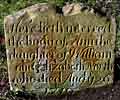 Grave marker to Ann Grave marker to Ann
North who died in 1719 |
During the period of the restoration of the fabric of the Minster by the Architect Ewan Christian, the floor of the nave was relaid to a predetermined pattern of larger and smaller stones by John Gregory, the Minster Mason and his assistant, John Cook. They used a mixture of new stone and appropriately-sized gravestones taken from the Minster’s surrounding churchyard. A schedule of these ledger stones is included in a publication by the Nottinghamshire Family History Society: Record Series Vol 118.
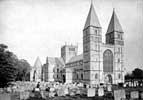 View of the minster from View of the minster from
the north-west corner of
the churchyard, c.1900 |
Some thirty were moved in this way during the 1870s, but many more were left in situ. The photograph from c.1900 confirms that the churchyard was still packed with gravestones at that date. During the first half of the twentieth century, however, the standing stones were gradually thinned out. Some were removed altogether, some were transferred to positions around the perimeter of the churchyard and others were laid flat.
A six-year programme of work from 1930 to 1936 saw the whole of the churchyard leveled and new turf laid to create the fine lawn to the north and west that can be seen and enjoyed today.
First World War graves
There are eight graves listed by the Commonwealth War Graves Commission (CWGC). Five of these are inscribed in the simple format used by CWGC, with the distinctive Portland stone headstone which is used both at home and abroad, but three of the fatalities are interred in family graves. The eight names, which can also be found inscribed on the Minster’s internal War Memorial, are:
Brown, John Harry
In
Loving memory
of
Francis Charles (Frank)
Youngest and dearly loved son of
Charles and Mary BROWN
Who died December 15 1908
In his 18th year
In sure and certain hope of the resurrection
to eternal life
Also
Vincent Archer Alphonso
Brother of the above
Killed in action Sept 13 1916
Aged 26 years
Buried at Clinchy, France
Also Corporal John Henry BROWN
1st Bt Sherwood Foresters
Died April 25 1919
Aged 31 years
Dearly loved husband of ADA BROWN
He answered his King and Country
He rallied to their call
He answers now his Maker
The grandest call of all |
Near West Entrance
Eaton, E.

1055 PRIVATE
E EATON
NOTTS & DERBY REGT
DIED 17 MAY 1915 |
North of Main West Path
Egleshaw, J. G.

In
Loving Memory of
MY DEAR HUSBAND
JOHN GEORGE EGLESHAW,
PROFESSIONAL TO THE SOUTHWELL GOLF CLUB,
ACCIDENTALLY KILLED AUG. 14TH 1917,
R.N. AIR SERVICE,
AGED 32 YEARS.
"THY WILL BE DONE."
ERECTED BY HIS WIDOW AND MEMBERS
OF THE SOUTHWELL GOLF CLUB. |
Near North side of Church
Hindson, John William
252051
Driver
J W HINDSON
Royal Field Artillery
14 May 1918 aet 43 |
North Side of Church
Musgrave, Tom
In loving memory of
Tom
Beloved son of
Henry and Mary MUSGRAVE
Who passed peacefully away
July 10 1916
Aged 23
The evening stars shine on the grave
Of one who fought amongst the brave
For King and Country
Greater love hath no man than this
That a man lay down his life for his friends
(inscribed on north kerb) |
Near North Side of Church
Raworth, L.
0243 Private
L RAWORTH
10 Aug 1918 aged 25 |
North of Main West Path
Suter, Walter
168496 Sergeant
W SUTER
Labour Corps
Durham Light Infantry
12 December 1918 |
North of Main West Path
Thompson, David
Second Lieut
D THOMPSON
1 May 1919 aged 31
Peace Perfect Peace
with loved ones far away |
North of Main West Path
Second World War graves
 Browne, John Michael Godfree, Flying Officer, Royal Air Force (Auxiliary Air Force) Browne, John Michael Godfree, Flying Officer, Royal Air Force (Auxiliary Air Force)
 Fox, James Crosby, Corporal, Royal Air Force Volunteer Reserve Fox, James Crosby, Corporal, Royal Air Force Volunteer Reserve
First World War grave marker
This is in the south west corner of the graveyard, fixed to the wall near the southern edge of Vicar’s Court. A small plate in the centre of the cross reads:
IN MEMORY OF
Major J P Becher DSO
(1/8 SHERWOOD FORESTERS)
WHO DIED ON 1.1.16 FROM WOUNDS RECEIVED IN THE
ATTACK ON THE HOHENZOLLE REDOUBT 16.10.15
SANS PEUR SANS REPROCHE |
The Wedge Grave
On the north side of the path leading from the west door to Westgate is a slab marking the grave of Susanna Wedge, for a short time matron of the “Incorporated Workhouse near this town” (i.e. the Thurgarton Hundred Incorporation Workhouse on the Upton Road, opened in 1824, which later, in 1836, became the Southwell Union Workhouse and is now owned by the National Trust). Susanna died in 1826 at the age of 30 after giving birth to a son, William John, who died aged 3 days and is buried by her side. She had been a working woman who had had several jobs and seems therefore to have been an independent and educated woman.
The poignant inscription on the slab (below) poses the question: why her father, rather than her husband, erected the stone, there being no indication that she was widowed?

READER BEHOLD THE UNCERTAINTY
OF HUMAN LIFE
This Stone is Erected by WILLIAM CADDICK
of Basford near Nottingham, To the memory of His
Daughter SUSANNA WEDGE Wife of JOHN WEDGE,
Who after having filled various situations in life with
much satisfaction and truly respected, was for a short
time Matron of the Incorporated Workhouse near this
Town. The duties of which Station she discharged with
great satisfaction to the Managers and comfort to
the Poor and died there in her first Child bed deeply
lamented the 24th day of April 1826 in the 31st year
of Her Age.
O Lord! hasten thy Kingdom and speedily reunite in
the indissoluble hands of Eternal felicity all those endearing
connexions which the ravages of time and death have
separated here below.
By the side of her lies Her Infant Son WILLIAM JOHN
Aged 3 Days
When the Archangels trump shall blow,
And souls to bodies join;
What crowds will wish their lives below:
Had been as short as thine. |
Graves of Bishops of Southwell
George Ridding (South-east of the South Transept)
 On the base: On the base:
Waiting for the coming of our Lord Jesus Christ. Go forth
in the strength of our Lord God and will make mention
of thy righteousness only |
On the top:
Here rests the body of GEORGE RIDDING DD, forty-third
Headmaster of St Mary’s College Winchester 1866-1884
First Bishop of Southwell 1884-1904 who was born
March 16 1828 and fell asleep August 30 1904 |
Laura Ridding (south-east of the south transept, alongside but to the south of the grave of her husband)
On the top:

Laura Elizabeth RIDDING wife of GEORGE RIDDING first Bishop
of Southwell. Daughter of Rundell PALMER first Earl of Selborne
Born 16 March 1849 Died 20 May 1939 Waiting for the coming
of the Lord Jesus Christ |
Sir Edwyn Hoskyns (south of the choir)

Here rests the body of Sir Edwyn HOSKYNS 12th Baronet
2nd Bishop of Southwell 1904-1925 Jesus and Mercy
who was born 22 May 1851 and fell asleep 2 December 1925
and of his wife Mary Constance Maud born 1853 Died 1939 |
Graves of last Vicars General
John Thomas Becher
Mary BECHER
The wife of the
Reverend John Thomas BECHER
Prebendary and Vicar General
of the Collegiate Church
of Southwell
Died on the 17th day of May 1837
Aged 68
The Reverend John Thomas BECHER
Vicar General and Prebendary
of the Collegiate Church
of Southwell
Died 3 Jan 1848
in the 79th year of his age |
South of the choir
George Wilkins
George WILKINS DD
Archdeacon of Nottingham and last Canon Residentiary
Of Southwell Collegiate Church. Died Aug 13 1865 aged 80
Also Amelia Auriol his wife. Born Sept 11 1794
Died Jan 31 1871 aged 77 |
South of the choir
Graves of Archbishops of York
Four Archbishops of York are known to be buried in Southwell Minster churchyard, but the precise locations are not now known:
Thomas de Corbridge |
Archbishop 1300-1304 |
died 22 September 1304 |
William Booth |
Archbishop 1452-1464 |
died 12 September 1464 |
Lawrence Booth |
Archbishop 1476-1480 |
died 19 May 1480 |
Edwin Sandys |
Archbishop 1577-1588 |
died 10 July 1588 |
[The monument to Edwin Sandys is in the North Transept, but it is not his tomb].
[The Booth brothers are believed to have been buried in the Booth Chapel, built at the western end of the south wall of the nave in the early 1460s and demolished in 1784]
|